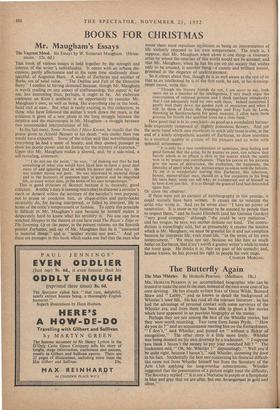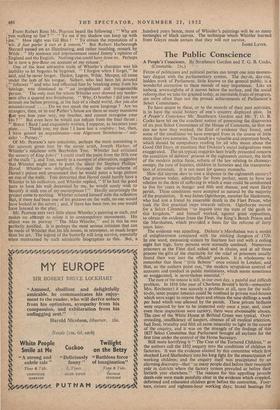The Butterfly Again
The Man Whistler. By Hesketh Pearson. (Methuen. 18s.)
MR. HESKETH PEARSON is an accomplished biographer who can be trusted to make the coat fit the man, instead of the man some coat of his own devising. He has already written lives of Oscar Wilde, Bernard Shaw and " Labby," and so knows in detail the background of Whistler's later life. He has read all the relevant literature ; he has had the advantage of personal contact with some survivors of the Whistler era, and from them has been able to glean a few stories which have appeared in no previous biography of the master.
Perhaps they are not among the best of the Whistler stories, but they were worth recording. Two came from James Pryde. " How do you do ? " said an acquaintance meeting him on the Embankment. " I don't," said Whistler, and passed on " without a flicker of recognition." The other story is a little more lively. Whistler was being dunned on his own doorstep by a tradesman. " I suppose you think I haven't the money to pay your wretched bill ? " The tradesman said, " Oh, Mr. Whistler ! " deprecatingly. " Well you'd be quite right, because I haven't," said Whistler, slamming the door in his face. Incidentally the best not concerning his financial difficul- ties came not from Whistler himself but from the Secretary of the arts Club applying for long-overdue subscriptions. Whistler suggested that the presentation of a picture might meet the difficulty. The Secretary replied : " It is not a Nocturne in purple or a Symphony in blue and grey that we are after, but our Arrangement in gold and silver," From Robert Ross Mr. Pearson heard the following : " Why are you walking so fast ? " " To see if my shadow can keep up with Hine." How right was Gil Bias " To obtain the reputation of a 'wit, it font parler a tort et a (ravers." But Robert Harborough Sherard passed on an illuminating, and rather touching, remark by Wilde : " My sentence and imprisonment raised Jimmy's opinion of i England and the Engiish. Nothing else could have done so. Perhaps he is now a pro-Boer on account of my release." One of the least attractive• traits of Whistler's character was his inability to let bygones be bygones. " I forgive when I forget," he said, and he never forgot. Haden, Legros, Wilde, Menpes, all came Under the lash 9f his tongue. Sickert, who had been his devoted " follower " and who had offended him by breaking away from his ' tutelage, was dismissed as " an insignificant and irresponsible Person." The only man for whom Whistler ever showed any tender- ness after a quarrel was Swinburne. " Why, 0 brother ! did you not consult me before printing, in the face of a ribald world, that you also misunderstand' Do we not speak the same language ? Are we strangers, then, or in our Father's house are there so many mansions tat you lose your way, my brother, and cannot recognise your kin ? " But even here he would not refrain from the final thrust : " Bravo ! Bard ! and exquisitely written, I suppose, as becomes your State. . . . Thank you, my dear ! I have lost a confrere ; but, then, I have gained an acquaintance—one Algernon Swinburne—` out- Sider '—Putney." Of Mr. Pearson's new anecdotes, perhaps the most interesting is the account given him by the scenic artist, Joseph Harker, of Whistler's relations with Beerbohm Tree. Whistler had criticised the scenery of King John (" I could smell the paint from the fifth row of the stalls "), and Tree, surely in a moment of aberration, suggested that Whistler might care to paint the decor for Stephen Phillips' Herod. Whistler was delighted, discussed the colour-scheme of Herod's palace and announced that he would paint a large picture on one of the walls. Tree demurred that Herod could hardly have a Whistler in his collection, and Whistler replied, " If he had the good taste to have his wall decorated by me, he would surely wish to beautify it with one of my masterpieces ! " Hardly surprisingly the project came to nothing. Whistler solaced himself with the reflection that, if there had been one of his pictures on the walls, no one would have looked at the actors ; and, if there has been two, no one would 'have listened to the play. Mr. Pearson says very little about Whistler's painting as such, and makes no attempt to relate it to contempdrary movements. His Object was to portray " The Man Whistler," and in this he was perfectly justified. It is perhaps the most serious. criticism that can 'be made of Whistler that his life looms, in retrospect, so much larger than his art. The legend of the butterfly will long survive, especially when maintained by such admirable biographies as this. But, a ,hundred years hence, most of Whistler's paintings will be so many rectangles of black canvas. The technique 'which Whistler learned from Gleyre made certain that they will not survive.
JAMES LAVER.











































































 Previous page
Previous page